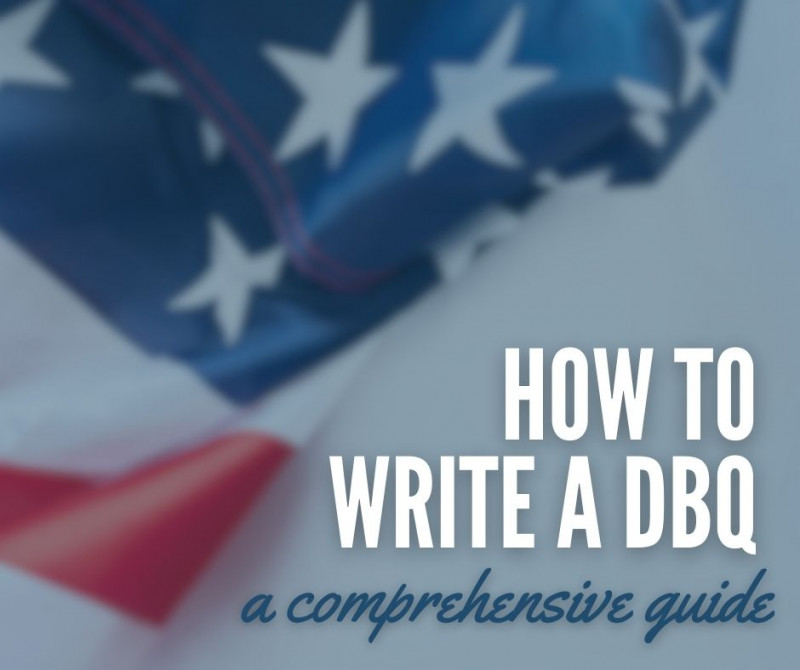
19 min
0
08.17.2023

Before writing a DBQ essay, you should first know what a DBQ essay is.
DBQ
DBQ is the short form for Document-Based Question. The report type shows up most frequently in social studies and US history (AP history) classes.
The structure of a DBQ essay is similar, regardless of the subject that the student is studying. In all cases, the candidate is provided with source information. Candidates then extract data from these source documents and incorporate them into the report.
Now that you understand what is a DBQ essay, the next step is to plan and write one. These essays typically cover much relevant information that students need to truly grasp a subject.
In this post, we'll talk about how a DBQ essay is put together and how to write and edit one to ensure that you receive a passing grade.
Exploring the DBQ Format
The Document-Based Question format explains what you'll likely write in this report. Document-based suggests that you will be provided with one or more relevant documents. This tests your knowledge of research and information-gathering methods. Within the source papers will be information either couched in prose or given in statistics or graphs.
Your first job is understanding the document before you start writing on it. Since this is based on the record in front of you, it might be tempting to think you only need to understand that piece of text or graphics. However, the DBQ format goes deeper. The questions that the format asks rely on both internal and external knowledge to perform well. Using information within the presented report or except will only get you half the points.
Additionally, a question many students ask is, "How long should a DBQ be?" The length of the report will vary, depending on the subject and the requirements of the college board, but students should generally aim for three to four body paragraphs, along with an introduction and a conclusion. For an AP-level history exam, this translates to 700 - 1000 words or thereabouts.
When composing an essay in response to a Document-Based Question, the emphasis should be placed on the quality of the material presented rather than the word count.
Preparing to Write a DBQ Essay
DBQ essays are unique among report type questions because they test deep knowledge of a subject and expect complex answers.
If you're wondering how to write a good DBQ essay, it starts with the planning phases. These are the things a student should do primarily:
- Read the Question Carefully: Many students start answering the question long before they finish reading it. Sometimes, this can lead to a fatal flaw, as the students answer a question that the exam doesn't ask.
- Familiarize Yourself with the Documents: The report is based on the document, so knowing what it contains will help you grasp what direction your thinking should go in. Spend enough time reading and interpreting the papers so you know what you're looking at.
- Note-Taking Strategies: When going through the document, you should take notes of important quotes or information you can reference with your external knowledge. Especially important are words, phrases, and cues that help you place the document writer's inherent bias.
In summary, as a person taking a DBQ, these are the things you should focus on:
|
Before you Read |
While you Read | As you Write |
| Recall information about the period you're writing on. | Annotate words and phrases that will provide relevant information to answering the question. |
Form a coherent thesis statement. |
| Read the source information for the documents presented. | Highlight words, phrases, and visual cues that will help you draw out your background knowledge of the events being mentioned. | Group the document and compare the groups against one another. |
| Recognize the opinions you may have to contrast in your essay. | Examine words, phrases, and visual cues to give you insight into the document's bias in the setting. | Build a complex essay, don't simplify things, but delve into them. |
How to Write a DBQ Essay in 4 Easy Steps

If you're tasked with writing a DBQ essay, you might feel overwhelmed, but it's not the most challenging thing in the world. DBQ structure has a well-defined layout, so following the structure and giving the report your own personal style is exactly what you're aiming for.
From there, you'll need a thesis statement, which you'll craft your body paragraphs to defend and present.
Finally, your convincing conclusion is the flourish that sets everything alight. Following this is supposed to give you a really good final report. Let's start with the first step, which is structuring your report.
Step 1: Structuring your DBQ Essay
The main aim of a DBQ essay is to convey your thoughts about a document to someone who wants to know what you think. It follows the standard structure of an article, with an introduction, a body, and a conclusion. However, how to structure a DBQ essay that will stand out is unique to this type of report. The structure should be along these lines:
- Introduction: Provide the historical context of the topic and intro the main question. State your thesis clearly in the opening, addressing the prompt and indicating the main points your report will cover.
- Document Analysis: Incorporate relevant information from the provided documents into your paragraphs. Analyze each document, highlighting key details and explaining how they support your argument. Define the necessary evidence you need.
- Outside Evidence: Integrate your broader historical ideas into the report using external sources. Use this external evidence to enhance your argument and provide context for the documents.
- Counterarguments: Acknowledge potential counterarguments and address them within your report. This showcases your critical thinking skills and strengthens your argument.
- Conclusion: Summarize the main points of your report and restate your thesis when you conclude. Offer a final analysis that underscores the significance of your argument and its implications for understanding the historical evidence and context.
Once you've sorted your structure out, we'll move on to building a solid thesis statement.
Step 2: Crafting a Strong Thesis Statement
The thesis statement forms the core of your thought process and arguments within your report and is how to start a DBQ essay the right way. Some would consider it the most critical part of the report.
To build a great thesis, look at these points:
- Engage with the Prompt: Carefully read the question and identify its central theme or question.
- Formulate a Response: Craft a concise response addressing the prompt's requirements. This should guide the direction of your report.
- Outline Main Points: Outline the main points you'll address in your report. These points will guide your argument and document analysis.
- Clear and Specific: Ensure your thesis is clear, specific, and not overly broad. Avoid vague statements that don't directly relate to the prompt.
You can look at an example DBQ thesis to learn more about how these theses are developed. With a few examples, you should know how crafting a DBQ process works.
Step 3: Building the Body Paragraphs
You could consider each body paragraph a slice of the larger DBQ essay. These paragraphs should fall into the categories that your plan deals with. In each paragraph, the process of building out your prose goes as follows:
- Topic Sentence: Begin each paragraph with a clear topic sentence that introduces the paragraph's main point.
- Document Integration: Reference relevant documents that support your argument. Provide specific examples or quotes from the paper.
- Analysis: Analyze the documents you've cited. Explain how each document's content, context, or perspective relates to your argument.
- Connection to Thesis: Always connect the information in the paragraph back to your thesis and the central question of the prompt.
The body should read well, and each paragraph should connect to the thesis statement.
Step 4: Delivering a Convincing Conclusion
Conclusions might seem like the easiest thing to write, but they are more than just a summary of your points. Your DBQ conclusion should do these four things:
- Summarize: Recap the main points of your report without introducing new information.
- Restate Thesis: Restate your thesis to remind the reader of your central argument.
- Final Analysis: Provide a definitive analysis of your argument's significance in the context of the prompt and historical understanding.
- Avoid Repetition: While restating key points, avoid repeating the exact phrases used in the introduction and body paragraphs.
Each provides much-needed closure to the report while still focusing on your thesis statement and valid points.
Polishing your DBQ Essay
If you think you're finished once the first draft of your essay has been written, nothing could be further from the truth. Unpolished document-based essays can lead to students losing a grade they worked hard to get. You should look at these methods to properly polish your DBQ essay:
➡️ Reviewing and Revising
Go through your report and search for consistency in tone and terminology. Also, ensure that your writing flows between paragraphs, making it much easier to read. Check your body paragraphs and ensure that they call back to your thesis. Revisit the document, and check that you didn't miss any references or cues that might be useful in the report. Finally, recheck your external evidence so that your presentation is factual and honest in its representation.
➡️ Proofreading Tips
Read the words carefully as you go through your report. You're looking for errors in spelling and grammar. Bad spelling and grammar could undermine an otherwise well-argued point. Ensure your sentence structure is grammatically sound (and that subjects and verbs agree). Check for punctuation issues that might change the meaning of your sentences. Finally, check the flow state of your sentences and paragraphs to make it easy for the reader to shift from one to the other.
➡️ Getting Feedback
If you're working on a DBQ outside of an exam setting, for a project submission, having someone else to look over your work is crucial to perfecting your essay. Ask someone in your class (or a recent graduate) to give it a once-over for you. If your lecturer has an open-door policy, use it to get feedback on your report and suggestions for what you should change. Finally, pay attention to the feedback you get. You don't need to implement all of it, but you should at least give it an honest hearing.
DBQ Example Essays
If you need some DBQ essay examples, there are many on the Studybay site for you to peruse. Pay particular attention to the details we covered in the previous section. Look at the example of a DBQ essay to understand how they were developed and written. It will provide a template for your own work.
DBQ Tips: Dos and Don'ts of Writing a DBQ Essay
When examining how to write DBQs, there are some things you should do and some you should avoid. Let's look at some of them.
Common Mistakes and How to Avoid Them
❌ Lack of a Clear Thesis: Avoid writing a thesis statement that's overly broad or vague. Try to make your thesis as succinct as possible.
❌ Ignoring Document Details: Many students don't delve into the documents but instead summarize them. DBQ essays require more in-depth consideration of the material.
❌ Misusing Outside Evidence: Integrate outside knowledge wisely. Ensure it supports your argument and is relevant to the topic.
❌ Disorganization: Avoid disorganized paragraphs. Use clear topic sentences and maintain a logical flow and organize your report.
Best Practices in DBQ Writing
✍️ There are some best practices for how to write a DBQ thesis that you should pay attention to. Among these are:
✅ Read the Question Three Times: Don't progress anywhere until you've read and internalized the question three times to avoid misremembering what you read.
✅ Figure out the Task: Circle the main words or key phrases to guide you toward crafting a proper answer.
✅ Ask the "What" Question: What is the purpose of this report, and what do you have to prove with your evidence? This will guide your report structure.
✅ Look at Issues to Be Included: These issues include economic, political, and social issues that may shape the question and period.
✅ Gather Outside Information: Make a shortlist of outside information you will need to argue your report.
✅ Closely Examine the Documents: Underline or highlight thematic keywords and phrases you might need to use later on in your report.
Following these practices will give you better results for your report.
Writing a DBQ: Time Management Skills
How to write a DBQ APUSH in the shortest time possible? In an exam setting, you should pay attention to this rough guide for managing your report time:
- Step 1: Develop a Plan (15 minutes)
- Step 2: Write your introduction (5 minutes)
- Step 3: Craft your thesis (20 minutes)
- Step 4: Develop your Body (2 hours and 15 minutes)
- Step 5: Conclusion (10 minutes)
- Step 6: Proofreading and review (10 minutes)
Practice Makes Perfect
As with most academic disciplines, practicing your DBQ essay skills will help. On Studybay, you can simply locate an example of a DBQ question that you can use as a foundation for testing yourself or obtain expert support for test preparation.
Tracking Your Progress
When you first start, writing one of these reports will be very time-consuming, but with practice, they get a lot easier to deal with. Track your progress through time-based means (how long it takes you to complete a report) and the APUSH DBQ Rubric score.
Understand the APUSH DBQ Rubric
A DBQ example essay will have a score based on the APUSH DBQ Rubric. Below is a general outline of how the Rubric works.
|
Reporting Section |
Scoring Criteria | Decision Rules |
| Thesis/Claim | 1 point | One point is awarded to the candidate if they make a claim that responds to the question and is written in one or two sentences. |
| Contextualization | 1 point | One point is awarded if the thesis and responses examine broader historical concepts. |
| Evidence | 0 - 3 points | Up to two points can be awarded if the candidate accurately examines data from the document. Another point is awarded for successfully integrating data from the record instead of using quotes to support arguments. |
| Analysis/Research | 0 - 2 points |
One point is awarded if the candidate explains the document's purpose, audience, and perspective. A further point is awarded if the candidate demonstrates a nuanced contextualized understanding of the historical events and issues that impacted it. |
FAQ
What is the importance of a DBQ?
How can I improve my DBQ writing skills?
What should be included in my DBQ essay?
How long should my DBQ essay be?
What mistakes should I avoid while writing a DBQ?
Do you use quotes in a DBQ essay?



